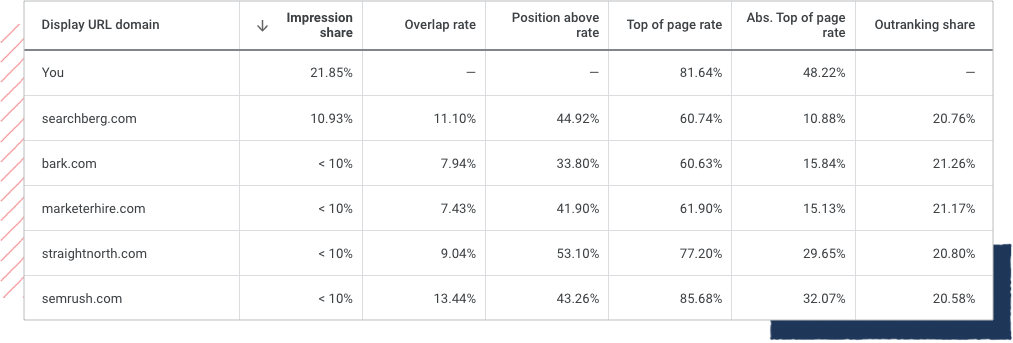Who is bidding against you in Google Ads? And what can you do about it? Google Ads Auction Insights data to the rescue!
Understanding who you compete against in Google Ads is critical to the long-term success of your digital marketing campaigns. Marketers who ignore their competitors are more likely to pay higher Costs Per Click (CPCs) and miss out on valuable conversions from their search campaigns.
What is the Google Ads Auction Insights Report?
The Auction Insights report is your best source of information about your Google Ads competitors. It reveals other sites that are bidding on the same keywords that you are and how visible their ads are compared to yours.
The data are presented at the campaign and keyword level, showing your domain against competing domains. Keep reading for an explanation of each of the metrics in this report.

Where to find the report in Google Ads

It lives under the “Keywords” menu in left nav of the Google Ads interface. You can see competitors at the campaign level and at the individual keyword level, so be sure to zoom in and out to see who you compete against on a large scale versus competitors that may show up only for a few keywords.
Once in the report, you’ll see a list of other domains that bid on your same keywords. Each domain has a variety of relevant metrics:
Impression Share: the number of impressions you received divided by the estimated number of impressions you were eligible to receive.
Overlap Rate: how often another advertiser’s ad received an impression in the same auction that your ad also received an impression.
Position Above Rate: how often another advertiser’s ad in the same auction showed in a higher position than your own, when both of your ads were shown at the same time.
Top of Page Rate: how often your ad (or the ad of another advertiser, depending on which row you're viewing) was shown at the top of the page in search results.
Absolute Top of Page Rate: the percent of your impressions shown as the very first ad above organic search results.
Outranking Share: how often your ad ranked higher in the auction than another advertiser’s ad, or if your ad showed when theirs did not.
I tend to favor the Overlap Rate and Position Above Rate metrics because they tell me the answers to two very important questions:
How often is a competitor’s ad showing up at the same time as mine?
How often is a competitor’s ad appearing higher on the page than mine?
These two metrics can provide insights about competitors’ budgets and bidding strategies. If their ad runs adjacent to yours and usually outranks you, it’s a safe bet that their overall budget is higher than yours—and they’re willing to pay a higher CPC to appear above your ad.
How to leverage Auction Insights: The challenge of one keyword with multiple intents
Google Ads is full of other advertisers bidding on the same keywords as you. But in many cases, your Google Ads competitors may not even be offering the same products or services. Yet their ads drive up your CPCs because one keyword can appeal to many types of advertisers.
Some keywords are easy to understand. It makes sense that multiple banks and lending sites could compete for a keyword like “refinance my mortgage.” The intent behind that search is pretty straightforward, and many sites can answer the query with high-quality content and strong calls to action.
But other search queries may be harder to answer without more context. Let’s look at one of my favorite examples of a keyword with multiple intents, a search for “windows upgrade.”
If you are a local service business that installs residential windows, you are likely looking for customers who want to replace the windows in their homes. But if you’re an IT company looking for small-business customers, your potential customers may be looking for PC maintenance and software upgrades.
Both advertisers can lay legitimate claim to this keyword because it’s hard to know what an individual searcher wants based simply on their search term.
What is an advertiser to do? First, you have to uncover your search competitors and try to determine their intent.
Who’s bidding on your brand name?
Pay close attention to your brand keywords to see which competitors are capitalizing on your name recognition. There are a few reasons competitors may do this.
You’ve spent a lot of money building your brand, and many people search for you by name. Competitors with similar products or services want to siphon off some of your organic search traffic without investing in their own brand.
Competitors are positioning themselves as an alternative to your products or services. Their ad copy may include more confrontational language and encourage searchers to try them instead.
Your brand is somewhat generic and is showing up alongside other advertisers for common keywords that may or may not be directly related to your products or services.
It is legal and permissible for other advertisers to bid on your brand keywords and have their ads appear above your organic and paid search results. Per Google’s trademark policy, they may not use any of your trademarks in their ad copy, unless they meet a few select criteria.
It’s a thorny subject and can often result in a game of whack-a-mole or even worse, escalating bidding wars.
You’ve identified your Google Ads competitors. Now what?
Check your Auction Insights reports at least weekly if your competitors are aggressive with large budgets at stake. Monthly may suffice if your keywords are less competitive.
Look at the campaign level and at individual keywords. This can take some time but will provide insights about a competitor’s priorities and strategies.
Once you find your competitors in your Auction Insights reports, take a calming breath. Competition is normal, and everybody is playing by the same rules.
Next, separate the domains into direct and indirect competitors. Direct competitors sell the same products and services that you do and would steal your customers if unchecked. Indirect competitors are bidding on the same keywords from adjacent industries but are not selling the same solutions.
Now, you have the right information to plan your competitive response. You have options:
Go to battle: Do you want to be aggressive with your CPC bids to squeeze your competitors’ margins until they retreat?
Live in harmony: Would you prefer to stay the course and try to peacefully coexist without driving up each other’s costs?
Hit ‘em where they ain’t: If your budget is more modest, mine the data to find less contested (and cheaper) keywords where you have a better chance of attracting qualified traffic.
De-escalate: Sometimes, direct competitors with an open line of communication can discuss a verbal agreement to avoid bidding on each other’s brand keywords.
Any of these strategies can be used effectively to get better results from your Google Ads investment. In many cases, you have to use more than one simultaneously if you face competition on multiple fronts.
No matter which industry you are in or how aggressive your competitors are, Auction Insights data can provide useful signals about the spend levels necessary to stand out and attract more customers from Google Ads.
Looking for more ways to beat your competitors in Google Ads? Or maybe you'd just like some help with your Google Ads audit? Our team of certified Google Ads experts can develop a customized strategy to get your site back on top. Workshop Digital is a Google Ads Premier Partner, placing us in the top 3% of North American agencies. Contact us to learn more today!

